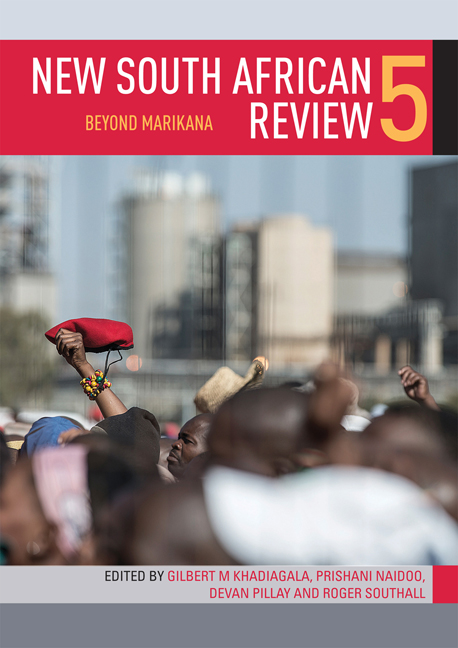Book contents
- Frontmatter
- Contents
- Preface
- Introduction: Political reconfigurations in the wake of Marikana
- PART 1 NEW POLITICAL DIRECTIONS?
- PART 2 ECONOMY, ECOLOGY AND LABOUR
- PART 3 STATE AND SOCIETY
- PART 4 SOUTH AFRICA IN THE INTERNATIONAL ARENA
- Introduction to Part 4
- Chapter 13 The evolution of South Africa's foreign policy
- Chapter 14 South Africa, the BRICS and human rights: In bad company?
- Chapter 15 Trading with the frenemy: How South Africa depends on African trade
- Contributors
- Index
Chapter 13 - The evolution of South Africa's foreign policy
from PART 4 - SOUTH AFRICA IN THE INTERNATIONAL ARENA
Published online by Cambridge University Press: 21 April 2018
- Frontmatter
- Contents
- Preface
- Introduction: Political reconfigurations in the wake of Marikana
- PART 1 NEW POLITICAL DIRECTIONS?
- PART 2 ECONOMY, ECOLOGY AND LABOUR
- PART 3 STATE AND SOCIETY
- PART 4 SOUTH AFRICA IN THE INTERNATIONAL ARENA
- Introduction to Part 4
- Chapter 13 The evolution of South Africa's foreign policy
- Chapter 14 South Africa, the BRICS and human rights: In bad company?
- Chapter 15 Trading with the frenemy: How South Africa depends on African trade
- Contributors
- Index
Summary
This chapter represents a synthetic overview of the key themes that have animated scholarly research into South Africa's foreign policy over the last two decades. These themes are situated against the broad contextual background of important philosophical challenges, transitional developments and managerial dilemmas during the formative presidential periods of Nelson Mandela and Thabo Mbeki. This context provides the analytical parameters for the focus on six themes that, arguably, shape debates and thinking about the conduct of South Africa's foreign policy: the institutional dynamics at the level of the state; the multilateral and global agenda; trade and economic diplomacy; the peace, security and mediation dimension; the donor and development assistance role and the scourge of xenophobia. These themes will continue to exercise a profound influence on the collective endeavour of South Africa's foreign policy community to sustain its standing as a middle power, with soft power assets, able to shape African and global agendas. Arising from these thematic considerations, some concluding thoughts highlight ongoing normative, substantive and policy challenges for the Zuma administration.
In his State of the Nation address on 14 February 2013, President Jacob Zuma reiterated some of the essential leitmotifs that have shaped South Africa's foreign policy since 1994, and echoed very similar values, emphases and priorities as those which underpinned the presidencies of his predecessors, Mandela and Mbeki. He talked, inter alia, about contributing to a stronger African Union (AU), supporting efforts to build a more stable and peaceful continent, building the pillars of South-South cooperation through BRICS, and strengthening North-South relations – particularly with the US, Europe and Japan (Zuma 2013). In short, President Zuma was referring to the very strong foreign policy foundation and legacy he had inherited in promoting South Africa's international engagements and external relations, a foundation that is essentially held together by the mortar of its moral capital, normative agency and political stature.
However, there are legitimate concerns that this capital, agency and stature are fast depreciating because of recent missteps and strategic blunders in the conduct of South Africa's foreign policy, especially under President Zuma's watch (Le Pere 2013): reference, for instance, is often made to South Africa's controversial tenure on the UN Security Council, the ongoing Dalai Lama visa debacles, the misguided and divisive campaign to win the chair of the AU's Commission and the tragic military misadventure in the Central African Republic.
- Type
- Chapter
- Information
- New South African Review 5Beyond Marikana, pp. 249 - 267Publisher: Wits University PressPrint publication year: 2015



